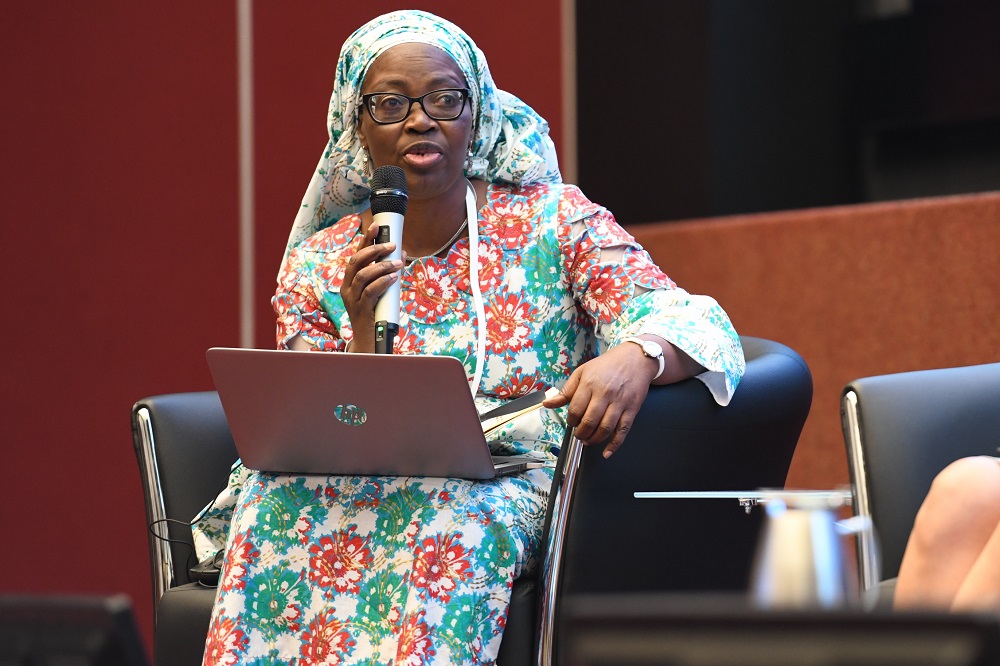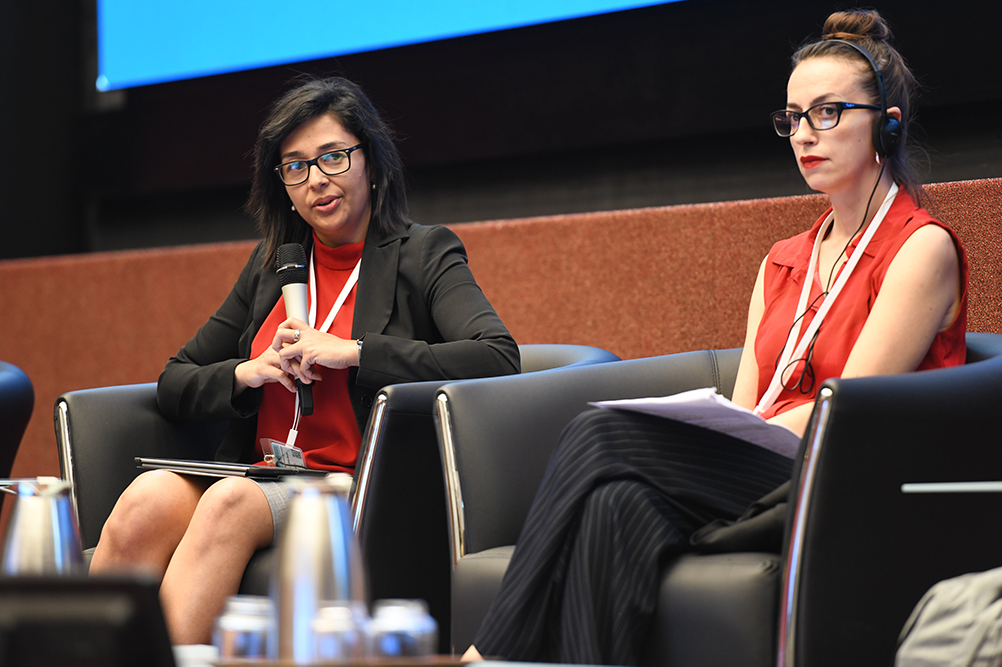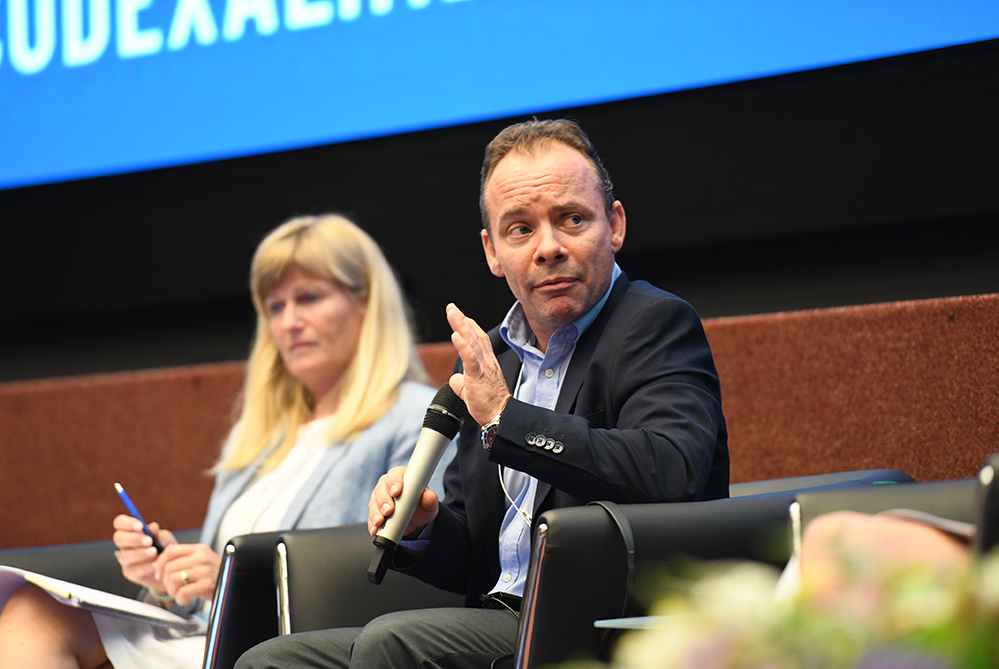Successful Codex Trust Fund countries set priorities and direction
A packed conference room saw past, present and future Codex Trust Fund (CTF) beneficiary countries describe their experiences and share the key priorities for successful projects.
The FAO/WHO Codex Trust Fund is in its fourth year of operation and, thanks to donor contributions, is now supporting 14 countries to build strong and sustainable national Codex systems that will allow all countries to participate fully and effectively in the work of Codex. In opening remarks at the Commission Tedros Adhanom Ghebreyesus, WHO Director-General said CTF is an “important mechanism which allows the Codex Alimentarius Commission to do its work”.
Past, present and future
Madame Leye from the Codex Contact Point in Senegal, a country in its third year of implementation of a CTF project, underlined the importance of awareness raising. “Identifying the priority standards for Senegal has helped us update our regulations and for the first time we are involving consumer organisations and the private sector”, she said.

Mme Leye, Senegal
Mirian Bueno Almendarez is Director of Food Safety at the National Agency for Agri-food Health and Safety (SENASA) in Honduras, the Codex Contact Point and project manager for the CTF2 in its first year of implementation. “We did in-depth work to ensure support from government at the highest possible level in Honduras”, she said. Understanding the level of commitment involved and recognising the challenges along the way “to establish a solid structure at the national level was also important”, said Bueno, in order for all actors to live up to their commitments.

Mirian Bueno, Honduras (left) and Katerina Jonovska, North Macedonia
Katerina Jonovska from the Department for EU and International Cooperation within the Food and Veterinary Agency in North Macedonia will be part of the future Codex Contact Point the country is seeking to create. “We have a lot to learn and a lot to do to build our national Codex structure”, she said. North Macedonia will be working with twinning partners Norway and Sweden to improve participation in Codex at both national and international levels. “I hope that by the end of this project we will become a Sweden or a Norway in terms of Codex”, she said.
In undertaking to twin with North Macedonia on the CTF project both Sweden and Norway realised there was an opportunity to share what they have learnt by participating actively in Codex. “This goes both ways and it also be a learning experience for us”, said Vigdis Møllersen who is a Senior Advisor in the Norwegian Food Safety Authority and Codex coordinator in Norway.
Support from FAO and WHO
Speaking via video link from the Pan American Health Organization (PAHO) in Brazil, Regional Food Safety Officer Simone Raszl explained the WHO/FAO role in providing technical and administrative assistance to the activities in CTF projects. “We also link the CTF activities to other food safety topics that we see as important to the countries”, she said.
Dirk Schulz, FAO Food Safety and Quality Officer, based in Rome said, “it is FAO and WHO as a team that provide support to CTF projects”. Technical review groups discuss proposals and make recommendations regarding who should be awarded funding. “We need to communicate findings, results, shortfalls and of course communicate with donors”, he said.

Dirk Schulz, FAO and Vigdis Møllersen, Norway (left)
The Codex Trust Fund Secretariat “manages the overall programme to keep it on track and moving forward”, said Catherine Mulholland, CTF Administrator. Common symptoms that impact on the success of an application include the level of stakeholder engagement in the country and how countries research their projects to identify national strengths and weaknesses. “There needs to be coherence and alignment in applications”, she said together with solid, detailed budgets.
A year from now
Sharing experiences and best practices in both applying to the CTF and managing projects is a valuable approach for countries looking to be part of the fund.
Senegal is looking ahead to consolidation of the ground gained and the continued rollout of Codex-related activities “with commitment from all our authorities” once the CTF project ends, said Leye.
“By next year we hope to have consolidated our national structures with solid foundations”, said Bueno, advocating for strong leadership and participation in CTF projects. “I encourage all countries to dare to fill in an application and to rise to the challenge”, she said.
“Next year I hope I will have a success story to share with you”, said Katerina Jonovska from North Macedonia, a hope echoed by Norway. “I hope we will know more about the priorities and to see perhaps how a Codex structure has evolved”, said Møllersen.
Read more
Learn more about the Codex Trust Fund and 13 more countries about to receive support and deadlines for new applications
At the heart of the Codex mandate are the core values of collaboration, inclusiveness, consensus building and transparency. Governmental and non-governmental, public and private organizations alike play a vital role in ensuring Codex texts are of the highest quality and based on sound science.
Codex would have little authority in the field of international standard setting if it did not welcome and acknowledge the valuable contributions made by observers. Expert technical bodies, industry and consumer associations
contribute to the standard-setting process in a spirit of openness, collaboration and transparency.
Intergovernmental organizations (IGOs) and international non-governmental organizations (NGOs) can apply for observer status in Codex in order to attend and put forward their views at every stage of the standard-setting process.
 Current Codex Alimentarius Commission
Current Codex Alimentarius Commission
Successful Codex Trust Fund countries set priorities and direction
A packed conference room saw past, present and future Codex Trust Fund (CTF) beneficiary countries describe their experiences and share the key priorities for successful projects.
The FAO/WHO Codex Trust Fund is in its fourth year of operation and, thanks to donor contributions, is now supporting 14 countries to build strong and sustainable national Codex systems that will allow all countries to participate fully and effectively in the work of Codex. In opening remarks at the Commission Tedros Adhanom Ghebreyesus, WHO Director-General said CTF is an “important mechanism which allows the Codex Alimentarius Commission to do its work”.
Past, present and future
Madame Leye from the Codex Contact Point in Senegal, a country in its third year of implementation of a CTF project, underlined the importance of awareness raising. “Identifying the priority standards for Senegal has helped us update our regulations and for the first time we are involving consumer organisations and the private sector”, she said.

Mme Leye, Senegal
Mirian Bueno Almendarez is Director of Food Safety at the National Agency for Agri-food Health and Safety (SENASA) in Honduras, the Codex Contact Point and project manager for the CTF2 in its first year of implementation. “We did in-depth work to ensure support from government at the highest possible level in Honduras”, she said. Understanding the level of commitment involved and recognising the challenges along the way “to establish a solid structure at the national level was also important”, said Bueno, in order for all actors to live up to their commitments.

Mirian Bueno, Honduras (left) and Katerina Jonovska, North Macedonia
Katerina Jonovska from the Department for EU and International Cooperation within the Food and Veterinary Agency in North Macedonia will be part of the future Codex Contact Point the country is seeking to create. “We have a lot to learn and a lot to do to build our national Codex structure”, she said. North Macedonia will be working with twinning partners Norway and Sweden to improve participation in Codex at both national and international levels. “I hope that by the end of this project we will become a Sweden or a Norway in terms of Codex”, she said.
In undertaking to twin with North Macedonia on the CTF project both Sweden and Norway realised there was an opportunity to share what they have learnt by participating actively in Codex. “This goes both ways and it also be a learning experience for us”, said Vigdis Møllersen who is a Senior Advisor in the Norwegian Food Safety Authority and Codex coordinator in Norway.
Support from FAO and WHO
Speaking via video link from the Pan American Health Organization (PAHO) in Brazil, Regional Food Safety Officer Simone Raszl explained the WHO/FAO role in providing technical and administrative assistance to the activities in CTF projects. “We also link the CTF activities to other food safety topics that we see as important to the countries”, she said.
Dirk Schulz, FAO Food Safety and Quality Officer, based in Rome said, “it is FAO and WHO as a team that provide support to CTF projects”. Technical review groups discuss proposals and make recommendations regarding who should be awarded funding. “We need to communicate findings, results, shortfalls and of course communicate with donors”, he said.

Dirk Schulz, FAO and Vigdis Møllersen, Norway (left)
The Codex Trust Fund Secretariat “manages the overall programme to keep it on track and moving forward”, said Catherine Mulholland, CTF Administrator. Common symptoms that impact on the success of an application include the level of stakeholder engagement in the country and how countries research their projects to identify national strengths and weaknesses. “There needs to be coherence and alignment in applications”, she said together with solid, detailed budgets.
A year from now
Sharing experiences and best practices in both applying to the CTF and managing projects is a valuable approach for countries looking to be part of the fund.
Senegal is looking ahead to consolidation of the ground gained and the continued rollout of Codex-related activities “with commitment from all our authorities” once the CTF project ends, said Leye.
“By next year we hope to have consolidated our national structures with solid foundations”, said Bueno, advocating for strong leadership and participation in CTF projects. “I encourage all countries to dare to fill in an application and to rise to the challenge”, she said.
“Next year I hope I will have a success story to share with you”, said Katerina Jonovska from North Macedonia, a hope echoed by Norway. “I hope we will know more about the priorities and to see perhaps how a Codex structure has evolved”, said Møllersen.
Read more
Learn more about the Codex Trust Fund and 13 more countries about to receive support and deadlines for new applications
 Codex and Observer
Codex and Observer
around the world since ancient times.
We might not always know where it comes from,
but we expect it to be available, safe and of good quality.









Leave a comment